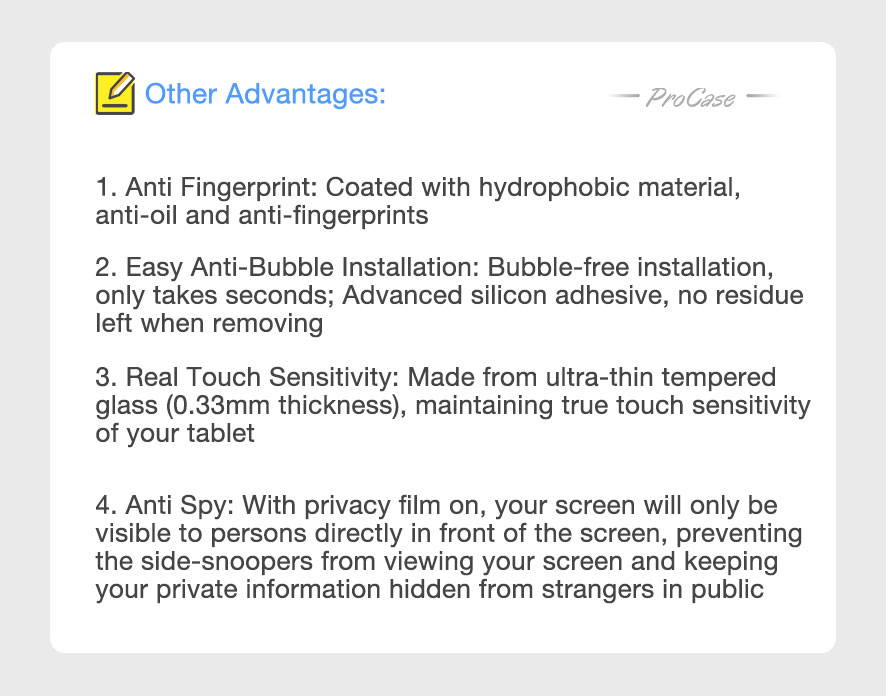WHAT IS 9H HARDNESS FOR SCREEN PROTECTORS?
The expensive tablet is an investment, and that makes the purchase of a good screen protector a necessity. The price of the screen protector is very cheap and easy to replace compared to the tablet. Having a big scratch on your tablet is like having an itch in your brain you just can't reach. Plus, it lowers the resale value of the device when you want to upgrade. A screen protector can keep the surface pristine, but buying one is more complicated than it should be. Even more, screen protectors vary in hardness. You may have seen the hardness rating on different packaging. Nonetheless, if you don't know what this label means, then you probably asking yourself, “What is 9H hardness?”
In this article, we’re looking at screen protector hardness and what you need to know to purchase a reliable protector.
Jump to:
1.Some Knowledge about Screen Protector
2.What is 9H Hardness for Screen Protectors?
3.About Mohs Hardness -Easy to Confuse with 9H Hardness
4.What Kind of Screen Protectors Should I Choose?
Some Knowledge about Screen Protector
A screen protector is a transparent layer of strong material that you can attach to your tablet to protect its screen. If you have ever used a device without a screen protector, you will know that the screen is prone to cracks and scratches in some cases, and it can even be completely damaged. But when using a screen protector, if your phone falls off your desk, gets shuffled around in a pocket or purse, or takes an impact, the screen protector, not the screen, breaks.
Therefore, when your screen protector is broken but the phone screen is not damaged, you know it has done its job, so you don't need to pay expensive screen replacement fees.
Needless to say, a good screen protector is a shield to protect the tablet touch screen from being damaged. In the past, tablet screen protective films were produced to protect tablet screens from scratches, oil, dust or dirt. With the development of mobile technology, tempered glass materials have been used for screen protectors. This provides better security for our tablets, especially mobile device screens. In addition, using a tablet screen protector may be a way to protect your eyes. There is an anti-reflective screen protector that can reduce the reflection of ultraviolet rays on the bright screen of our tablet. This can protect our eyes from UV rays. More importantly, the screen protector can protect the privacy of your tablet. The anti-spy screen protector can protect your tablet's private data from prying eyes. This kind of screen protection film is embedded with a special material layer, so that the visible range of the screen is only 30 degrees directly in front of the side. With this screen protector, the person standing next to you cannot see your tablet screen.
Nowadays, the variety of films on the market are endless. Whether it is glass film or thin plastic, it can protect your tablet screen to a certain extent. The glass-type film is very protective, so it is also widely welcomed by people. The most important propaganda point in the promotion of the tempered glass film is the hardness, because the film itself is a protective measure to prevent scratches on the screen or the body. When it comes to the hardness of the film, 4H hardness was advertised when PET was a plastic film before. At present, the most common publicity for tempered glass film is "9H hardness".
What is 9h Hardness for Screen Protectors?
"9H hardness" refers to the different hardness levels of the drawing pencil lead. The lead ranges from 6B (the softest) to 9H (the hardest). During testing, manufacturers scratch the surface of screen protectors starting with a 6B pencil all the way up to a 9H pencil. The hardness rating is determined at the point the pencil lead scratches the surface. If the pencils are not able to scratch the surface of the screen protector until a 9H pencil is used, it means that the screen protector has a 9H level of hardness.
About Mohs Hardness -Easy to Confuse with 9H Hardness
The main function of the film is to prevent scratches. For scratches, the Mohs hardness is the most suitable reference index. In mineralogy, the ability of one substance to penetrate into another substance is called scoring hardness, also known as Mohs hardness, or hardness for short. High-hardness substances can leave scratches on low-hardness substances, but not vice versa.
From the Mohs hardness table, we know that among the common things, nails are 2.5, aluminum and copper are 3, ordinary iron is 4-5, stainless steel is 5.5, and ordinary glass is 5.5. However, the hardness of the processed tempered glass film can reach 7, so nails and ordinary metals cannot scratch the tempered film.
What Kind of Screen Protectors Should I Choose?
The hardness of different types of screen protectors can prevent or leave a scratch mark. The 9H hardness screen protector will protect the screen of your phone from damage and allow very minimal to zero scratches to the screen protector. To get 9H screen protectors, ProCase's products will be your best choice.
In addition to the 9H hardness surface with 99% ultra-high-definition transparency, ProCase's tempered film also has other advantages, such as:

For more tips, please click to follow theProCase brand, we will share with you more practical experience and bring better products.
